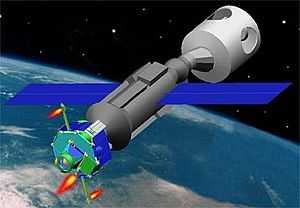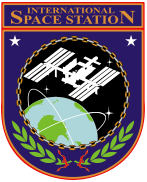Interim Control Module

The Interim Control Module (ICM) is a NASA constructed module designed to serve as a temporary "tug" for the International Space Station in case the Zvezda service module was destroyed or not launched for an extended period of time. It was derived from a formerly-classified Titan Launch Dispenser used to distribute reconnaissance satellites to different orbits. It would have been able to prolong the lifespan of the Zarya module by providing equivalent propulsion capabilities to the Service Module, although not any of the other life support capabilities.
In 1997 NASA requested that the Naval Research Laboratory study the feasibility of adapting an existing, heritage spaceflight system to provide low-cost, contingency propulsion operations for the International Space Station (ISS).
After determining that the system could be adapted in time to meet NASA's schedule requirements, NRL was granted authority to proceed with the Interim Control Module (ICM). From its inception ICM was a contingency option for attitude control and reboost of the ISS that would allow NASA to preserve the on-orbit construction schedule in case of delays in the launch of the Russian Service Module.
ICM was to launch on board the Space Shuttle, deploy from the Shuttle's cargo bay, and mate with the ISS at the Russian Control Module (called Zarya). Once on orbit ICM would provide sufficient fuel for one to three years of operation.
ICM is in a caretaker status at NRL's Payload Processing Facility in Washington, D.C.
References
- "NRL Revamping Control Module for NASA Space Station". NRL. June 1997.
- "ICM - Interim Control Module". NRL.
| |||||||||||||||||||||||||||||||||||||||||||||||||||||||||||||||||||
